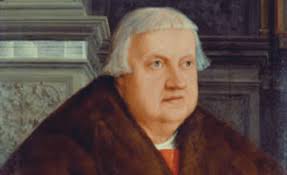Conrad Peutinger, born in 1475, is a name that stands tall among the intellectual and political figures of the Renaissance. As a true Renaissance man, Peutinger exemplified the era’s pursuit of knowledge, embodying the fusion of scholarship, humanism, and statesmanship. His contributions spanned multiple fields—law, diplomacy, and the preservation of ancient history—making him a significant figure in European history.
In this article, we’ll take a deep dive into Peutinger’s life, exploring his background, his pivotal role in preserving Roman antiquities, his influence in humanist circles, and his lasting contributions to Renaissance thought and European diplomacy. Conrad Peutinger was not just a scholar but also a diplomat with the rare ability to bridge the ancient world with the rapidly changing intellectual landscape of the Renaissance.
The Early Life of Conrad Peutinger: Foundations in Knowledge and Law
Born into a prominent family in Augsburg, Germany, in 1475, Peutinger was raised in a milieu that valued both learning and civic duty. His father, also named Conrad, was a respected lawyer and held a significant administrative role in Augsburg’s city government. Growing up in this environment, Peutinger was exposed early on to the workings of both law and public service. But more than that, his family’s status meant that he had access to an education far beyond what most people of his time could dream of.
Peutinger was sent to the University of Padua in Italy, one of the leading centers of learning in Europe at the time. This was a pivotal experience for the young Conrad. Padua, at the heart of the Italian Renaissance, was buzzing with intellectual activity. It was here that Peutinger was introduced to the works of Cicero, Livy, and Virgil, and the classical world became the bedrock of his intellectual pursuits. In addition to law, he immersed himself in the study of ancient Roman literature, history, and philosophy, fields that would shape his career and legacy.
After completing his studies, Peutinger returned to Augsburg, armed with a prestigious education in Roman law and humanist principles. His legal expertise quickly earned him a place in the city’s administration, where he worked as a city clerk and later as a counselor. However, while his legal work was important, it was his scholarly endeavors that would place him in the annals of history.
Humanism and Renaissance Scholarship: Preserving the Wisdom of Antiquity
During the Renaissance, the revival of classical learning was seen as crucial for advancing human knowledge. Conrad Peutinger played a pivotal role in this intellectual movement. His passion for Roman antiquities was not merely academic; Peutinger believed that the wisdom of ancient Rome held lessons for contemporary society. In this sense, he was part of a broader humanist movement that sought to connect the values of the classical world with the new human-centered worldview of the Renaissance.
One of Peutinger’s most remarkable achievements was the discovery and publication of the Tabula Peutingeriana, a Roman road map that dates back to the 4th century AD. The Tabula Peutingeriana is an elongated parchment scroll depicting the road network of the Roman Empire. It stretches from Britain in the west to India in the east, illustrating the scope and grandeur of Roman infrastructure. This map is not just a geographical artifact; it’s a cultural treasure that encapsulates the Roman Empire’s vision of its place in the world.
Peutinger acquired this map from a fellow scholar, but he immediately recognized its significance. He understood that the map was more than a relic—it was a window into how the Romans conceptualized their empire and the connectedness of their world. By preserving and circulating the map, Peutinger ensured that future generations would have a tangible link to the Roman Empire’s remarkable achievements in governance and infrastructure.
In addition to his work with the Tabula Peutingeriana, Peutinger was an avid collector of ancient manuscripts and other historical texts. His library became a repository of knowledge, filled with Roman and Greek works that had been lost to many scholars of the Middle Ages. His commitment to preserving these works was driven by his belief that ancient wisdom could inform contemporary governance, law, and ethics.
Diplomatic Achievements: The Statesman Scholar
While Peutinger’s contributions to scholarship are impressive, his role as a diplomat and statesman was equally significant. In 1512, he was appointed as a counselor to Maximilian I, Holy Roman Emperor, a position that placed him at the center of European politics during a time of significant upheaval. Peutinger’s ability to navigate the intricate and often treacherous waters of diplomacy was rooted in his classical education, particularly his deep understanding of Roman law and governance.
Peutinger was involved in several key diplomatic missions on behalf of the emperor. His legal knowledge, combined with his humanist ideals, allowed him to negotiate treaties and settle disputes with a level of sophistication that was rare for his time. His legal expertise and diplomatic acumen made him a trusted advisor not only to Maximilian but to other European leaders as well.
In fact, Peutinger’s role in diplomacy cannot be overstated. He was instrumental in forging alliances and maintaining peace between the various states of the Holy Roman Empire, and he also served as a mediator between European monarchs. His ability to blend humanist principles with realpolitik made him a unique figure in the European political landscape of the early 16th century.
The Tabula Peutingeriana: A Monument to Roman Engineering and Geography
The Tabula Peutingeriana deserves special mention, not just for its content but for what it symbolizes about Peutinger’s approach to knowledge. The map is about 7 meters long and 34 centimeters wide, offering a compressed but detailed view of the Roman world. Unlike modern maps that prioritize geographical accuracy, the Tabula Peutingeriana is more concerned with the relationships between places, particularly the network of roads that connected the far reaches of the Roman Empire.
The map includes depictions of major cities like Rome, Constantinople, and Alexandria, as well as smaller towns and settlements, complete with illustrations of buildings, rivers, and other landmarks. Peutinger’s decision to preserve and publish the map was not just an academic exercise; it was a profound statement about the continuity of civilization. By highlighting the interconnectedness of the Roman world, Peutinger reminded his contemporaries of the potential for human achievement when guided by the values of order, law, and infrastructure.
The Tabula Peutingeriana also serves as a metaphor for Peutinger’s life. Just as the map connected distant lands, Peutinger’s work connected ancient wisdom with contemporary thought, and his diplomatic efforts connected nations and rulers in a time of discord. The map is a lasting symbol of Peutinger’s belief that knowledge and connection were the keys to progress.
Peutinger’s Legacy: A Renaissance Man for the Ages
Conrad Peutinger’s life and work reflect the very essence of the Renaissance—a period characterized by the rebirth of classical knowledge and the application of that knowledge to contemporary challenges. His contributions to the preservation of Roman antiquities, particularly the Tabula Peutingeriana, ensured that future generations could access the wisdom of the ancient world. Through his diplomatic work, Peutinger demonstrated that humanist values could inform statecraft and that knowledge was not just for the academy but for the practical world of politics and governance.
What makes Peutinger truly remarkable is his ability to bridge the gaps between the ancient and modern worlds, between scholarship and politics, and between idealism and pragmatism. He was a scholar who understood that knowledge had to be preserved but also applied. He was a diplomat who knew that law and justice were not abstract ideals but tools that could bring peace and stability to Europe.
Today, Conrad Peutinger is remembered as one of the great humanist thinkers of the Renaissance, but his legacy goes beyond that. His work reminds us of the power of knowledge and the importance of preserving the past while building a better future. Peutinger’s life was dedicated to the belief that the lessons of history could guide the present, and his work continues to inspire scholars and diplomats alike.
Conclusion
Conrad Peutinger’s life is a testament to the power of humanism, scholarship, and diplomacy. Born in 1475, he became one of the most influential figures of the Renaissance, leaving a legacy that continues to resonate today. Through his work with Roman antiquities, particularly the Tabula Peutingeriana, Peutinger preserved the wisdom of the ancient world, ensuring that future generations could learn from the achievements of the Roman Empire. His diplomatic work, meanwhile, showcased the practical application of humanist ideals, helping to maintain peace and stability in a tumultuous Europe.
In an era defined by its rediscovery of classical knowledge, Peutinger stood out as a figure who not only understood the past but used it to shape the present. His life and work serve as a reminder that the pursuit of knowledge is not just an intellectual exercise but a path to progress, peace, and human flourishing.



